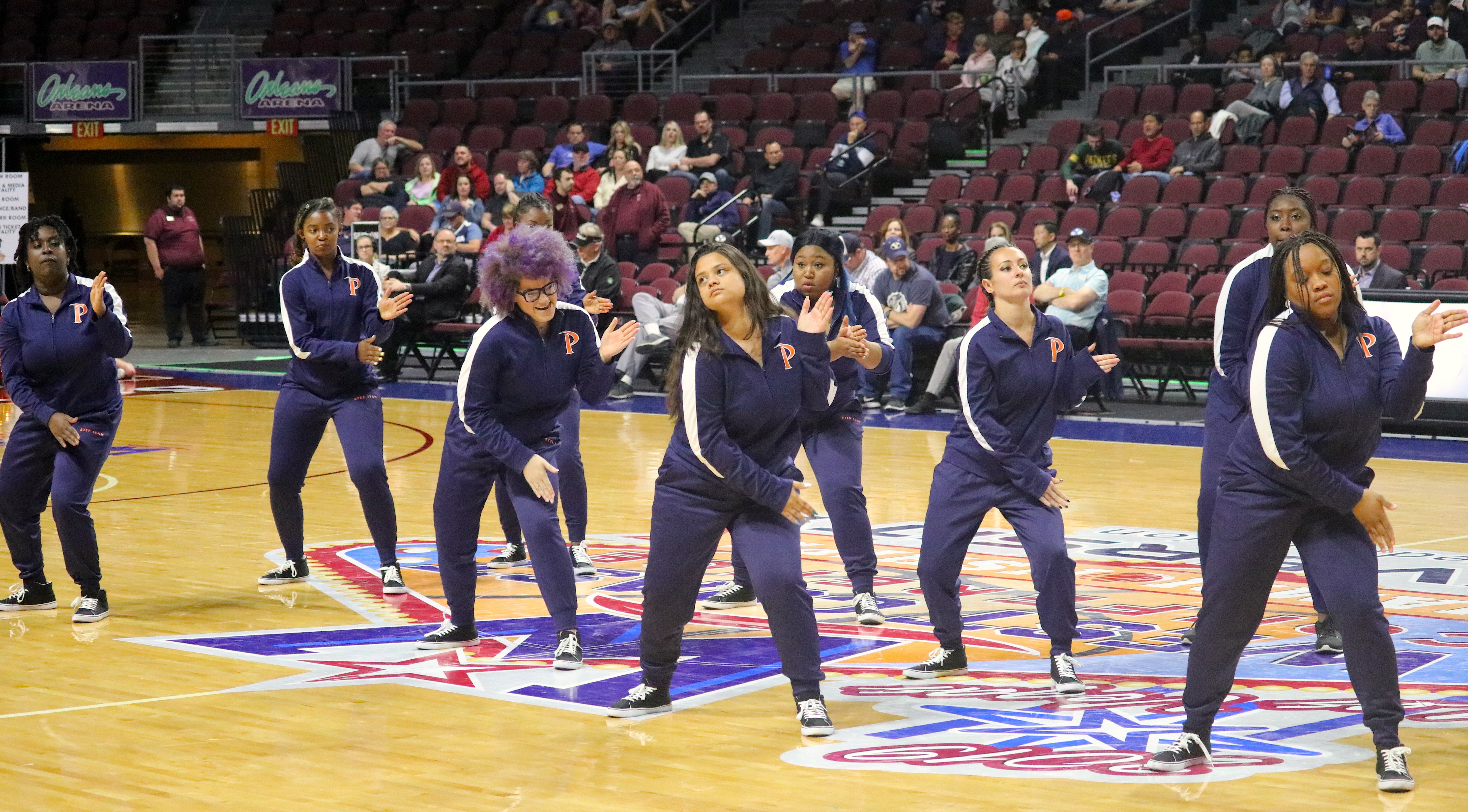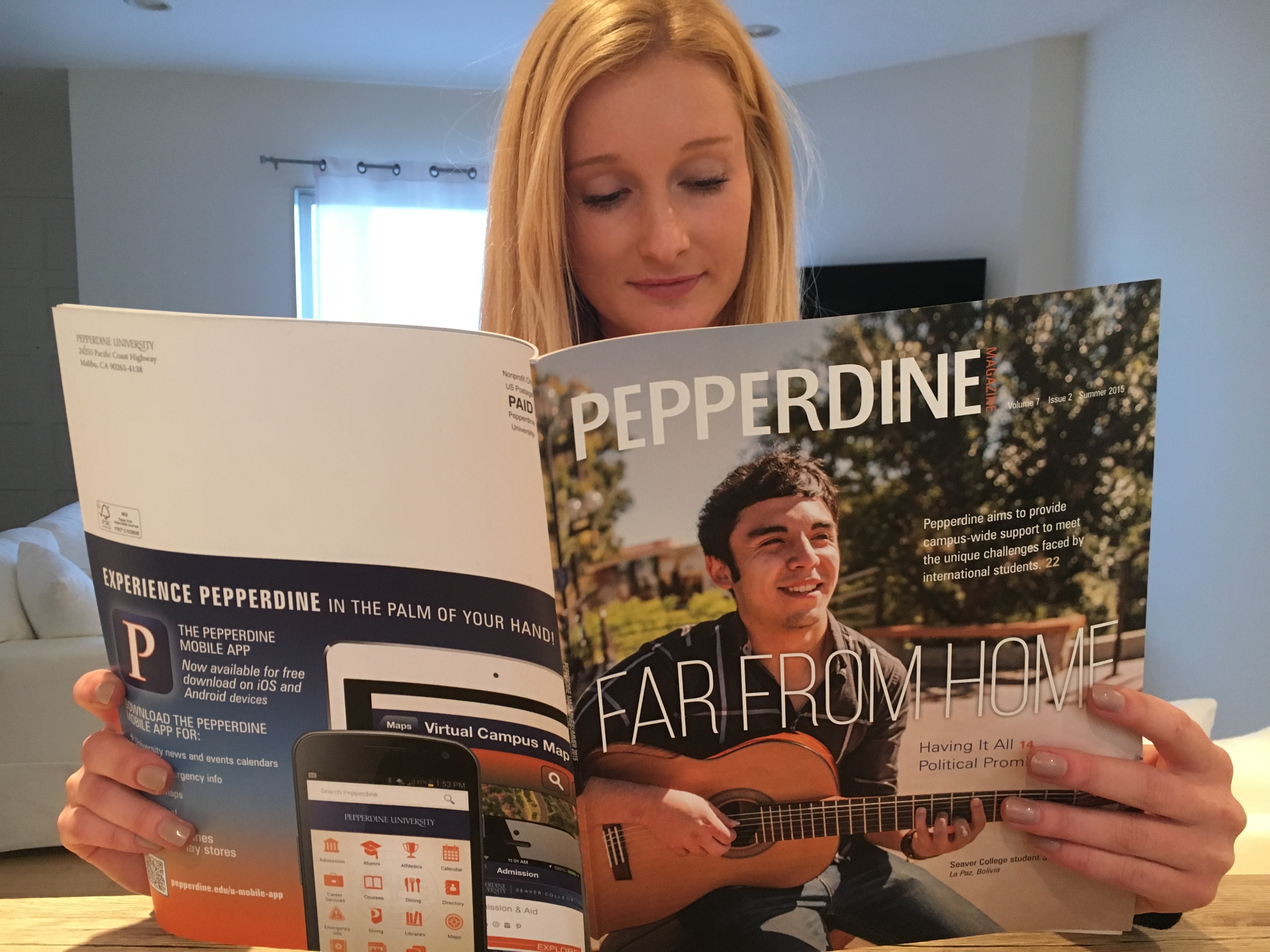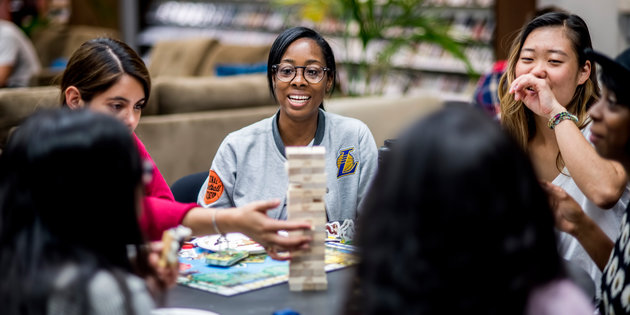
Pepperdine’s Step Team features 19 teammates who are making strides to diversify Pepperdine’s campus culture
The team brings solidarity and interconnectedness to Pepperdine’s Black community, said David L. Humphreys Jr., associate dean of Student Affairs for Diversity and Inclusion. Pepperdine’s Step Team bridges the cultural gap many Black students feel at a historically white institution.
“Step to me is like a portal — a view into black culture where there isn’t a lot of it here at Pepperdine,” said Jordyn Berry, junior business administration major and member of Pepperdine’s Step Team.
Only 4.5 percent of Pepperdine undergraduates are Black, according to Seaver College’s official website. This makes black students one of the smallest ethnic groups on campus.
Students and faculty discussed their experience with stepping at Pepperdine.
How stepping creates cultural literacy on campus
While stepping at a Pepperdine basketball game, an on-campus dance competition such as “PSI U Think You Can Dance?” or at a Pepperdine step showcase, the students on Pepperdine’s Step Team gain the experience of solidary to one another and to their ancestors, and give valuable cultural literacy to all of their viewers, members said.
A Pepp Post poll 53 students found that 51 percent had not been exposed to stepping before attending Pepperdine.
By exposing students to stepping, Pepperdine’s Step Team plays a key role in creating cultural literacy for all students toward Black culture.
“That rhythm disrupts this white normality that dominates this campus,” Humphreys said. “It provides a different rhythm. It forces our culture and ethos to hear a different sound. That’s what makes it so powerful.”
Pepperdine’s Step Team also plays a key role in creating cultural literacy for students toward black women particularly.
“There is nothing more amazing than seeing African American women performing together,” said Eric Wilson, Pepperdine associate chaplain and faculty adviser for Pepperdine’s Step Team.“This is a gift that the Step Team offers to Pepperdine’s community. There is something very special about seeing African American women in their beauty, strength and creativity living bodily in front of us. Step is stepping up and saying, ‘No, you don’t get a chance to define our identity, we get the chance to define our identity,’ and when we see other people doing that, that means we all can do that.”
History of step
The poll found that roughly 56 percent of students surveyed do not know the history of stepping.
Humphreys and Wilson traced the history of stepping from Africa to America.
“Step is a part African indigenous experience that followed slaves,” Humphreys said. “It was imbedded in the lives of slaves.”
Stepping has been traced to many African communities, however, the widely- known form of stepping in Africa is the Gumboot Dance Of South Africa.
South African Gumboot dancing stems from workers in the gold mines during the migrant labor system and oppressive Apartheid Pass Laws, Veronica Hilbring wrote in an August 2017 Essence.com article. During this time, workers were separated from their families and forced to work in harsh conditions, not being allowed to communicate to each other verbally.
The workers used the pounds and stomps of the gumboots to communicate.
“Step and movement has always been at the source of the Africanist idea,” Humphreys said. “It’s a form of worship, socialization, and a way to connect with the spirit of our ancestors.”
Today, stepping is still commonly practiced in black communities. One popular channel of stepping today is in black fraternities and sororities, Wilson said.
“Through stepping, these fraternities and sororities express the essence of their Greek organization and being African American,” Wilson said.
Unaffiliated step teams evolved from black Greek organizations for the purpose of dance expression, Wilson said.
Stepping at Pepperdine
Being a part of the Step Team has had a great impact on students.
Students said the Step Team has helped them gain confidence, create close friendships and has made them proud of their individuality.
“Stepping in South Central, and here (at Pepperdine) has made me proud to be where I’m from,” said Shanelle Wilkins, a junior psychology major and captain of Pepperdine’s Step Team. “It made me see the art and culture of South Central. It made me see the beauty in it and forget about the stigma behind the area.”
Sharra Hardy, senior international studies major and chaplain of Pepperdine’s Step Team, said stepping at Pepperdine gives students the ability to express themselves openly on the dance floor.
“For step teams unaffiliated with Greek life, it’s a way to be yourself,” Hardy said. “It really shows on the dancefloor through dances and steps. Through facial expressions, you could be angry and have the ‘grit’ face or you can be happy,”
Outside of Pepperdine’s Black Student Association, Pepperdine’s Step Team offers Black members ways of self expression.
“I love that they are able to have that community outside of BSA,” said Heavin Hunter, political science major and BSA Service Chair. “I feel like it is one of the only clubs that is majority Black. It allows for Black girls and boys to be themselves unapologetically and express themselves through dance.”
Step at Pepperdine builds community as well as connecting black students to their history.
“It is so important to have step here because as they step, they connect,” Humphreys said. “Not only to their ancestors that came before, but to each other,”
Bridging the gaps
The poll found that 89 percent of students polled are aware of Pepperdine’s Step Team and roughly 83 percent have seen Pepperdine’s Step Team perform..
The Pepperdine’s Step Team presence on campus has a profound impact on Pepperdine’s Black community.
“Step is a chance to show what Black culture is, because BSA can only do so much, but we’ll always have a certain connotation in a PWI (Predominantly White Institution),” Berry said.“With everyone loving the Step Team, they are kind of forced to watch the fact that it’s a part of black culture.”
Many students said Pepperdine has been shifting into an increasingly culturally literate campus.
“I think as time goes on Pepperdine has really grown in their open mindedness,” said Hannah Cheng, freshman integrated marketing communication major and a member of the Step Team. “Pepperdine is becoming more progressive. On the surface, Pepperdine might look like a subdued community, but Pepperdine is constantly becoming more progressive.”
The Step Team has aided this progression.
“Exposing people to new things is what Pepperdine is all about,” Hardy said. “We are supposed to be well rounded, we are a liberal arts school for that reason. If that’s the case, stepping belongs here. People need to see different cultures.”
For the non-Black student who join Pepperdine’s Step Team, they are able to gain valuable cultural experience.
“When white folk participate on the Step Team, they are able to experience soul and get connected to the sound of Black ancestors,” Humphreys said.
Cheng, one of the non-Black members, said she understands the importance in experiencing Black movement.
“Even though most of the Step Team is African American, we do have a few white people,” Cheng said. “I’m the only Asian right now, and I’m rooting for more Asians to join in the future. To have this diverse group of girls who are so passion about stepping, which is stemming from Black culture, I think that it’s fitting in with Pepperdine’s new direction.”
The history and future of step at Pepperdine
Step is a club under the Intercultural Affairs Office and only recently gained support from Athletics, Humphreys said.
“One of the responsibilities of Intercultural Affairs is to help facilitate belonging among historically minoitize communities,” Humphreys said. “We try to empower students to create spaces in which they could become interconnected with the African Diaspora, and step does that.”
ICA provides guidance and counsel to its leadership and resources, such as purchasing their uniforms. Pepperdine Athletics provides additional financial support, as well as opportunities for the Step Team to perform at Pepperdine Athletic events.
“We wanted to be under Pepperdine’s Athletics at some capacity but we weren’t on Athletics radar,” said Sarah Arthur, senior film studies major and a member of Pepperdine’s Step Team. “It wasn’t until Vegas 2018 and strangers came up to us saying that they never seen something like this before, because it’s normally dance or cheer that performs at tournaments. People thought it was so cool. (Athletics) noticed that.”
Pepperdine Athletics saw the value in having a step team.
“Step Team is a staple on campus,” said Hillary Koenig, assistant director of Marketing and Athletics. “We (Pepperdine’s Athletics) could just see the energy that they brought to the games, and we had to be a part of that.”
Elisabeth Bowen completed the reporting for this story under the supervision of Dr. Christina Littlefield and Dr. Theresa de los Santos in Jour 241 in Spring 2019. Dr. Littlefield supervised the web story.



